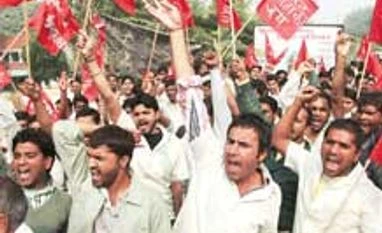The Union labour ministry plans to club three laws - Trade Unions Act, 1926, the Industrial Employment (Standing Orders) Act, 1946 and the Industrial Disputes Act, 1947 - into a single code for industrial relations. This is expected to drastically change the employer-employee relations. The industry will be empowered to retrench or shut down more easily, but at the same time, an adequate safety net for the workers will also have to be ensured. Forming trade unions will become more rule-bound and calling flash strikes will become almost impossible for workers. Business Standard takes a look at some key proposals in the Industrial Relations Bill:
PROPOSAL: Firms with 300 workers can retrench, against 100 at present without permission
IMPACT: Industries incentivised to hire more
PROPOSAL: Compensation package for retrenched workers increase three times to 45 days pay for every completed year
IMPACT: Workers will be able to sustain while finding another job
PROPOSAL: Workers can raise objection to retrenchment within three years
IMPACT: Will curb undue litigations
PROPOSAL: Labour court, board of arbitration and tribunal court won't exist; only industrial tribunal to continue
IMPACT: Will remove multiplicity of courts
PROPOSAL: Workers will have to give two-six weeks notice to employer before calling a strike
IMPACT: Will put an end to flash strikes across industries
PROPOSAL: Go-slow, gherao, squatting or demonstration at employer's house illegal during conciliation
IMPACT: Employers will be saved from harassment
PROPOSAL: Fine for illegal strike increased manifold, up to Rs 50,000 from Rs 50 at present
IMPACT: Workers will be cautious in their protests
PROPOSAL: No govt consent required for workers to move courts in case concilation fails
IMPACT: Will speed up conciliation process
PROPOSAL: No outsider to be office bearer of trade unions; in unorganised sector, only two outsiders allowed
IMPACT: May restrict politicisation of trade unions
PROPOSAL: Trade union deemed registered if application not processed within two months by govt
IMPACT: Time-bound registration of trade unions
Provisions likely to be incorporated in the Bill
PROPOSAL: Re-skilling funds for retrenched workers
IMPACT: Workers will be better skilled to find another job
PROPOSAL: Mandatory recognition of trade unions for dealing with employers
IMPACT: Employer will have to accept a union as representative of workers
PROPOSAL: Setting up a tripartite adjudication board
IMPACT: Quick redressal of disputes arising out of retrenchment or conflicts
PROPOSAL: Firms with 300 workers can retrench, against 100 at present without permission
IMPACT: Industries incentivised to hire more
PROPOSAL: Compensation package for retrenched workers increase three times to 45 days pay for every completed year
IMPACT: Workers will be able to sustain while finding another job
PROPOSAL: Workers can raise objection to retrenchment within three years
IMPACT: Will curb undue litigations
PROPOSAL: Labour court, board of arbitration and tribunal court won't exist; only industrial tribunal to continue
IMPACT: Will remove multiplicity of courts
PROPOSAL: Workers will have to give two-six weeks notice to employer before calling a strike
IMPACT: Will put an end to flash strikes across industries
PROPOSAL: Go-slow, gherao, squatting or demonstration at employer's house illegal during conciliation
IMPACT: Employers will be saved from harassment
PROPOSAL: Fine for illegal strike increased manifold, up to Rs 50,000 from Rs 50 at present
IMPACT: Workers will be cautious in their protests
PROPOSAL: No govt consent required for workers to move courts in case concilation fails
IMPACT: Will speed up conciliation process
PROPOSAL: No outsider to be office bearer of trade unions; in unorganised sector, only two outsiders allowed
IMPACT: May restrict politicisation of trade unions
PROPOSAL: Trade union deemed registered if application not processed within two months by govt
IMPACT: Time-bound registration of trade unions
Provisions likely to be incorporated in the Bill
PROPOSAL: Re-skilling funds for retrenched workers
IMPACT: Workers will be better skilled to find another job
PROPOSAL: Mandatory recognition of trade unions for dealing with employers
IMPACT: Employer will have to accept a union as representative of workers
PROPOSAL: Setting up a tripartite adjudication board
IMPACT: Quick redressal of disputes arising out of retrenchment or conflicts
Source: Ministry of Labour and Employment
)